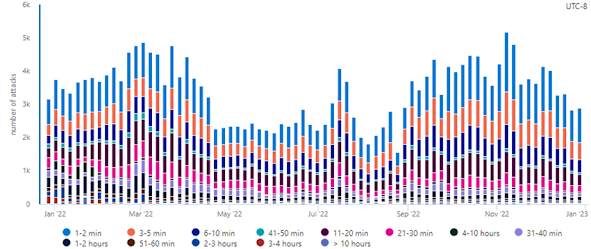As organizations
strengthen their defenses and take a more proactive approach to
protection, attackers are adapting their techniques
and increasing the sophistication of their operations. Cybercrime continues to
rise with the industrialization of the cybercrime economy providing
cybercriminals with greater access to tools and infrastructure.
In the first half of
2022, the cyberthreat landscape was focused around the war in Ukraine and the
rise of nation state attacks and hacktivism across the world. In February,
Ukraine was hit with the largest distributed denial of service (DDoS) attack ever
in the country’s history, impacting government websites and banking web
services. As the conflict continued, there was a ripple effect to western
countries, including the UK, US, and Germany. UK financial services firms
experienced a significant increase in DDoS attacks as
they were heavily targeted by nation state attackers and hacktivists looking to
disrupt Ukraine’s allies.
Hacktivism continued
to be rampant throughout the year, including Taiwanese websites experiencing outages
in August 2022 due to DDoS attacks ahead of House Speaker Nancy Pelosi’s arrival
in Taiwan. Beyond attacks with political motives, DDoS attacks also impacted a
wide range of industries. In particular, the gaming industry continued to be
highly targeted. In March 2022, a DDoS attack brought down the game servers
of Among Us, preventing players from accessing the popular multiplayer game for
a few days. A new version of RapperBot (heavily
inspired by the Mirai botnet) was used in the second half of 2022 to target
game servers running Grand Theft Auto: San Andreas.
In this blog, we
share trends and insights into DDoS attacks we observed and mitigated
throughout 2022.
2022 DDoS attack
trends
Large volume of
attacks during the holiday season
In 2022, Microsoft
mitigated an average of 1,435 attacks per day. The maximum number of attacks in
a day recorded was 2,215 attacks on September 22, 2022. The minimum number of
attacks in a day was 680 on August 22, 2022. In total, we mitigated upwards of
520,000 unique attacks against our global infrastructure during 2022.
Figure 1. Attack
volume
This year, we saw a
lower volume of attacks in June through August and a high volume of attacks
during the holiday season until the last week of December. This is in line with
attacks trends we have seen in the last few years, except for 2021 where there
were fewer attacks during the holiday season. In
May, we mitigated a 3.25 terabits per second (TBps) attack in Azure, the
largest attack in 2022.
DDoS protection tip: Make sure to
avoid having a single virtual machine backend so it is less likely to get
overwhelmed. Azure DDoS Protection covers
scaled out costs incurred for all resources during an attack, so configure
autoscaling to absorb the initial burst of attack traffic while mitigation
kicks in.
TCP attacks remain
the most common attack vector
TCP attacks were the
most frequent form of DDoS attack encountered in 2022, comprising 63% of all
attack traffic, which includes all TCP attack vectors: TCP SYN, TCP ACK, TCP
floods, etc. Since TCP remains the most common networking protocol, we expect
TCP-based attacks to continue to make up most DDoS attacks. UDP attacks were
significant as well with 22% of all attacks (combined for UDP flood and UDP
amplification attacks), while Packet anomaly attacks made up 15% of attacks.
Figure 2. Attack type
Out of UDP flood
attacks, spoofed floods consumed most of the attack volume with 53%. The
remaining attack vectors were reflected amplification attacks, with the main
types being CLDAP, NTP, and DNS.
We observed TCP reflected amplification attacks becoming
more prevalent, with attacks on Azure resources using diverse types of
reflectors and attack vectors. This new attack vector is taking advantage of
improper TCK stack implementation in middleboxes, such as firewalls and deep
packet inspection devices, to elicit amplified responses that can reach
infinite amplification in some cases. As an example, in April 2022, we
monitored a reflected amplified SYN+ACK attack on an Azure resource in Asia.
The attack reached 30 million packets per second (pps) and lasted 15 seconds.
Attack throughput was not very high, however there were 900 reflectors
involved, each with retransmissions, resulting in high pps rate that can bring
down the host and other network infrastructure.
DDoS protection
tip: To
protect against UDP and TCP attacks, we recommend using Azure DDoS Protection.
For gaming customers, consider using A10 virtual appliances and Azure
Gateway Load Balancers to help with volume-based attacks.
Shorter attacks
continue to be popular.
Figure 3. Attack duration
Shorter duration
attacks were more commonly observed this past year, with 89% of attacks lasting
less than one hour. Attacks spanning one to two minutes made up 26% of the
attacks seen this year. This is not a new trend as attacks that are shorter
require less resources and are more challenging to mitigate for legacy DDoS
defenses. Attackers often use multiple short attacks over the span of multiple
hours to make the most impact while using the fewest number of resources.
Short attacks take
advantage of the time it takes systems to detect the attack and for mitigation
to kick in. While time to mitigation may only take one or two minutes, the
information from those short attacks can make it into the backend of services,
impacting legitimate usage. If a short attack can cause a reboot of the
systems, this can then trigger multiple internal attacks as every legitimate
user tries to reconnect at the same time.
To read the full article go here


